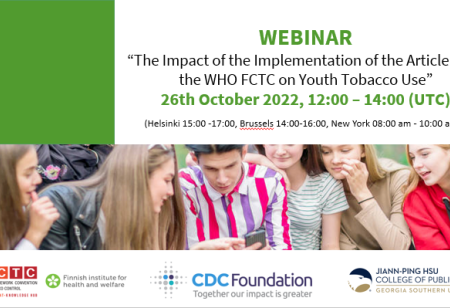

This week, 11.-13.12.2019, a group of international experts in tobacco control, and the Convention Secretariat of the WHO Framework Convention on Tobacco Control (WHO FCTC), gathered to the Finnish Institute for Health and Welfare (THL) to review the draft of Indicator Compendium that will be used to monitor the Global Strategy to Accelerate Tobacco Control – Advancing Sustainable Development through the Implementation of the WHO FCTC 2019–2025 (Global Strategy).
The Global Strategy, adopted at the eight session of the Conference of the Parties in 2018, is intended to guide the implementation of the WHO FCTC for the next seven years (2019–2025). The strategic goals of the Global Strategy are related to the measures to decrease tobacco use and tobacco-attributable deaths and diseases; building cross-sectoral and sustainable country-level capacity for tobacco control; and contributing in advancing the United Nations Sustainable Development Goals.
In addition, the Global Strategy contains 20 indicators which refer to the progress in the implementation of the WHO FCTC, and the support and assistance provided to the Parties to the Convention.
“The indicators will help measuring the progress of the implementation of the Global Strategy and prioritize the work of the Convention Secretariat, as well as highlighting areas for Parties to concentrate on,” says Dominique Nguyen, technical officer at the Convention Secretariat.
The WHO FCTC has 181 Parties covering more than 90% of the world population.
The meeting in Helsinki brought together experts with extensive knowledge in setting up and running effective tobacco surveillance systems, monitoring programs at different administrative levels, developing and utilizing indicators used to measure the implementation and impact of tobacco control programs.
“The now developed Indicator Compendium will help the Convention Secretariat to track the progress and report it to the Parties in a standardised way,” says specialist Hanna Ollila, manager of THL’s WHO FCTC Secretariat’s Knowledge Hub on Tobacco Surveillance, which hosted the meeting.
The Knowledge Hub hosted by the Finnish Institute for Health and Welfare is the only one in the European region. The seven WHO FCTC Secretariat’s Knowledge Hubs established support Parties in the implementation of the WHO FCTC at global and national levels.





